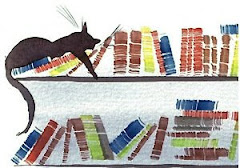With the almost-certain appointment of Hillary Clinton as secretary of State, Barack Obama seems indeed decided to imitate Abraham Lincoln, who "pulled in all the people who had been running against him into his Cabinet," as Obama himself has summarized the thesis of Doris Kearns Goodwin's book on the Lincoln presidency, "Team of Rivals" (look at the cover on our right bar).
That seems to be political astute at this moment. However, one should be aware that in 1861 it didn't work that well for Lincoln. The problems created by the decision to put in the cabinet William Seward as secretary of State and Salmon Chase as Treasury secretary are well described by Matthew Pinsker, who teaches Civil War history at Dickinson College in Pennsylvania, in this piece for the Los Angeles Times:
Lincoln's decision to embrace former rivals inevitably meant ignoring old friends -- a development they took badly. "We made Abe and, by God, we can unmake him," complained Chicago Tribune Managing Editor Joseph Medill in 1861. Especially during 1861 and 1862, the first two years of Lincoln's initially troubled administration, friends growled over his ingratitude as former rivals continued to play out their old political feuds.In fairness, Goodwin describes several of these more difficult moments, such as when Secretary of State William Seward tried to seize political command from Lincoln during the Ft. Sumter crisis. But she passes over their consequences too easily.Though Seward, the former New York senator who had been the Republican front-runner, eventually proved helpful to the president, the impact of repeated disloyalty and unnecessary backroom drama from him and several other Cabinet officers was a significant factor in the early failures of the Union war effort.By December 1862, there was a full-blown Cabinet crisis."We are now on the brink of destruction," Lincoln confided to a close friend after being deluged with congressional criticism and confronted by resignations from both Seward and Treasury Secretary Salmon P. Chase. Goodwin suggests that Lincoln's quiet confidence and impressive emotional intelligence enabled him to survive and ultimately forge an effective team out of his former rivals, but that's more wishful thinking than serious analysis.Consider this inconvenient truth: Out of the four leading vote-getters for the 1860 Republican presidential nomination whom Lincoln placed on his original team, three left during his first term -- one in disgrace, one in defiance and one in disgust.Simon Cameron was the disgraced rival, Lincoln's failed first secretary of War. Goodwin essentially erased him from her group biography, not mentioning him in the book's first 200 pages, even though he placed third, after Seward and Lincoln, on the first Republican presidential ballot. Cameron proved so corrupt and inept that the Republican-controlled House of Representatives censured him after he was removed from office in 1862.Chase was the defiant rival. The Treasury chief never reconciled himself to Lincoln's victory, continuously angling to replace him. Lincoln put up with this aggravation until he secured renomination and then dumped his brilliant but arrogant subordinate because, in his words, their "mutual embarrassment" was no longer sustainable.Atty. Gen. Edward Bates was the disgusted rival. The elder statesman -- 67 when he was appointed -- never felt at home in the Lincoln Cabinet and played only a marginal role in shaping policy. He resigned late in the first term. His diary reflects deep discontent with what he considered the relentless political maneuvering of his Cabinet peers and even the president. (...)Only Seward endured throughout the Civil War. He and Lincoln did become friends, and he provided some valuable political advice, but the significance of his contributions as Lincoln's secretary of State have been challenged by many historians, and his repeated fights with other party leaders were always distracting.John Hay, one of Lincoln's closest aides, noted in his diary that by the summer of 1863, the president had essentially learned to rule his Cabinet with "tyrannous authority," observing that the "most important things he decides & there is no cavil."Over the years, it has become easy to forget that hard edge and the once bad times that nearly destroyed a president. Lincoln's Cabinet was no team. His rivals proved to be uneven as subordinates. Some were capable despite their personal disloyalty, yet others were simply disastrous.
So, we should hope that Obama's Cabinet will be a team and that his previous rivals Clinton and Richardson will prove to be capable and loyal. One should be aware, however, that an hyper-ambitious secretary of State with hawkish views in foreign policy will present more than a risk of personal disloyalty, she could alienate the very political base who was critical in Obama's election, and create a disastrous infighting inside the administration.












